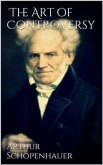Truths of the physical order may possess much external significance, but internal significance they have none. The latter is the privilege of intellectual and moral truths, which are concerned with the objectivation of the will in its highest stages, whereas physical truths are concerned with it in its lowest.
Bitte wählen Sie Ihr Anliegen aus.
Rechnungen
Retourenschein anfordern
Bestellstatus
Storno









